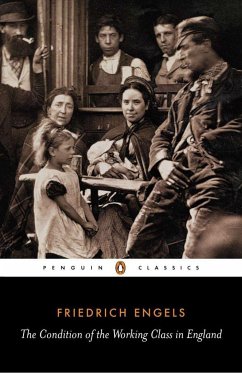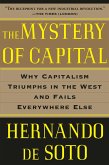15,99 €
inkl. MwSt.
Versandfertig in über 4 Wochen

8 °P sammeln
- Broschiertes Buch
- Merkliste
- Auf die Merkliste
- Bewerten Bewerten
- Teilen
- Produkt teilen
- Produkterinnerung
- Produkterinnerung
Written when Engels was only twenty-four, and inspired in particular by his time living among the poor in Manchester, this forceful polemic explores the staggering human cost of the Industrial Revolution in Victorian England.
Engels paints an unforgettable picture of daily life in the new industrial towns, and for miners and agricultural workers depicting overcrowded housing, abject poverty, child labour, sexual exploitation, dirt and drunkenness in a savage indictment of the greed of the bourgeoisie. His fascinating later preface, written for the first English edition of 1892 and included…mehr
Andere Kunden interessierten sich auch für
![History of the Russian Revolution History of the Russian Revolution]() Leon TrotskyHistory of the Russian Revolution19,99 €
Leon TrotskyHistory of the Russian Revolution19,99 €![History of the Russian Revolution History of the Russian Revolution]() Leon TrotskyHistory of the Russian Revolution22,99 €
Leon TrotskyHistory of the Russian Revolution22,99 €![Hell and Other Destinations Hell and Other Destinations]() Madeleine AlbrightHell and Other Destinations27,99 €
Madeleine AlbrightHell and Other Destinations27,99 €![The Mystery of Capital The Mystery of Capital]() Hernando De SotoThe Mystery of Capital21,99 €
Hernando De SotoThe Mystery of Capital21,99 €![Russians Among Us Russians Among Us]() Gordon CoreraRussians Among Us29,99 €
Gordon CoreraRussians Among Us29,99 €![Team of Five Team of Five]() Kate Andersen BrowerTeam of Five26,99 €
Kate Andersen BrowerTeam of Five26,99 €![The Anatomy of Revolution The Anatomy of Revolution]() Crane BrintonThe Anatomy of Revolution13,99 €
Crane BrintonThe Anatomy of Revolution13,99 €-
-
Written when Engels was only twenty-four, and inspired in particular by his time living among the poor in Manchester, this forceful polemic explores the staggering human cost of the Industrial Revolution in Victorian England.
Engels paints an unforgettable picture of daily life in the new industrial towns, and for miners and agricultural workers depicting overcrowded housing, abject poverty, child labour, sexual exploitation, dirt and drunkenness in a savage indictment of the greed of the bourgeoisie. His fascinating later preface, written for the first English edition of 1892 and included here, brought the story up to date in the light of forty years further reflection. A masterpiece of committed reporting and an impassioned call to arms, this is one of the great pioneering works of social history.
Based on the original translation by Florence Wischnewetzky, this volume is edited by Victor Kiernan, whose foreword considers Engels s friendship with Marx, and the book s position as a seminal work of socialism. Also included are notes, a detailed index, new chronology and further reading and a revised forward.
Engels paints an unforgettable picture of daily life in the new industrial towns, and for miners and agricultural workers depicting overcrowded housing, abject poverty, child labour, sexual exploitation, dirt and drunkenness in a savage indictment of the greed of the bourgeoisie. His fascinating later preface, written for the first English edition of 1892 and included here, brought the story up to date in the light of forty years further reflection. A masterpiece of committed reporting and an impassioned call to arms, this is one of the great pioneering works of social history.
Based on the original translation by Florence Wischnewetzky, this volume is edited by Victor Kiernan, whose foreword considers Engels s friendship with Marx, and the book s position as a seminal work of socialism. Also included are notes, a detailed index, new chronology and further reading and a revised forward.
Produktdetails
- Produktdetails
- Penguin Classics
- Verlag: Penguin Books UK
- Revised edition
- Seitenzahl: 304
- Erscheinungstermin: 2. Juni 1987
- Englisch
- Abmessung: 199mm x 128mm x 22mm
- Gewicht: 226g
- ISBN-13: 9780140444865
- ISBN-10: 0140444866
- Artikelnr.: 21159482
- Penguin Classics
- Verlag: Penguin Books UK
- Revised edition
- Seitenzahl: 304
- Erscheinungstermin: 2. Juni 1987
- Englisch
- Abmessung: 199mm x 128mm x 22mm
- Gewicht: 226g
- ISBN-13: 9780140444865
- ISBN-10: 0140444866
- Artikelnr.: 21159482
Born in Westphalia in 1820, Friedrich Engels was the son of a textile manufacturer. After military training in Berlin and already a convert to communism, Engels went to Manchester in 1842 to represent the family firm. A relationship with a mill-hand, Mary Bums, and friendship with local Owenites and Chartists helped to inspire his famous early work, The Condition of the Working Class in England in 1844. Collaboration with Marx began in 1844 and in 1847 he composed the first drafts of the Manifesto. After playing an active part in the German revolutions, Engels returned to work in Manchester until 1870, when he moved to London. He not only helped Marx financially, but reinforced their shared position through his own expositions of the new theory. After Marx’s death, he prepared the unfinished volumes of Capital for publication. He died in London in 1895.
The Condition of the Working Class in England - Friedrich Engels Edited
with a Foreword by Victor Kiernan
Foreword
To the Working Classes of Great Britain
Preface to the First German Edition
Preface to the English Edition
Introduction
The state of the workers before the Industrial Revolution
The jenny
Emergence of the industrial and the agricultural proletariat
The throstle, the mule, the power-loom, the steam-engine
The victory of machine-work over hand-work
The development of industrial might
The cotton industry
The hosiery manufacture
The manufacture of lace
Dyeing, bleaching, printing
The manufacture of wool
The linen trade
The manufacture of silk
The production and manufacture of iron
Coal-mining
The production of pottery
Agriculture
Roadways, canals, railroads, steamboats
Summary
The emergence of the proletariat as a factor of national importance
The middle-class's view of the workers
The Industrial Proletariat
Classification of the proletariat
Centralization of property
The levers of modern manufacture
Centralization of population
The Great Towns
The impression produced by London
The social war and the system of general plundering
The lot of the poor
General description of the slums
In London: St. Giles and the adjoining quarters
Whitechapel
The interior of the workers' dwellings
The homeless in the parks
Night refuges
Dublin
Edinburgh
Liverpool
Factory towns: Nottingham, Birmingham, Glasgow, Leeds, Bradford,
Huddersfield
Lancashire: General description
Bolton
Stockport
Ashton-under-Lyne
Stalybridge
Detailed description of Manchester: the general system of its building
The Old Town
The New Town
The method of construction of working-men's quarters
Courts and side streets
Ancoats
Little Ireland
Hulme
Salford
Summary
Lodging-houses
Overcrowdedness of population
Cellar dwellings
The clothing of the workers
Food
Tainted meat
Adulteration of provision
False weights, etc.
General conclusion
Competition
Competition among the workers determines the minimum of wages, competition
among the property-holding people determines their maximum
The worker, the slave of the bourgeoisie, is forced to sell himself by the
day, and by the hour
Surplus population
Commercial crises
A reserve army of workers
The hard lot of this reserve army during the crisis of 1842
Irish Immigration
The causes and figures
Description by Thomas Carlyle
Lack of cleanliness, crudeness and drunkenness among the Irishmen
The influence of Irish competition and of the contacts with the Irish upon
the English workers
Results
Preliminary remarks
The influence of the above-described conditions on the health of the
workers
The influence of large towns, dwellings, uncleanliness, etc.
The facts
Consumption
Typhus, in particular in London, Scotland, and Ireland
Digestive troubles
The results of drunkenness
Quack remedies
"Godfrey's Cordial"
Mortality among workers, especially among young children
Accusation of the bourgeoisie of social murder
Influence on the mental and moral condition of the workers
Absence of the necessary conditions for education
Inadequacy of evening and Sunday schools
Ignorance
The worker's living conditions give him a sort of practical training
Neglect of the workers' moral training
The law as the only instructor in morals
The worker's conditions of life tempt him to disregard law and morality
The influence of poverty and insecurity of existence upon the proletariat
Forced work
The centralization of the population
Irish immigration
The difference in character between the worker and the bourgeois
The proletarian's advantages over the bourgeois
The unfavourable sides of the proletarian character
Drunkenness
Sexual irregularities
Neglect of family duties
Contempt for the existing social order
Crimes
Description of the social war
Single Barnches of Industry. Factory-hands
The influence of machinery
Hand-loom weavers
The work of men being superseded by machinery
Female labour, the dissolution of the family
The reversal of all relations within the family
The moral consequences of the mass employment of women in factories
Jus primae noctis
The work of children
The apprentice system
Subsequent measures
The facts related by the Factory Report
Long working-day
Night-work
Cripples
Other deformities
The nature of factory work
Relaxation of the whole organism
Special diseases
Testimony of the Commissioners
Premature old age
The specific influence of factory work upon the female physique
Some especially injurious branches
Accidents
The bourgeoisie's opinion of the factory system
Factory laws and agitation for the Ten Hours' Bill
The stupefying and demoralizing nature of factory work
Slavery
Factory regulations
The truck system
The cottage system
The comparison of the serf of 1145 with the free working man of 1845
The Remaining Branches of Industry
Stocking-weavers
The lace industry
Calico printers
Staffordshire
Sheffield
Production of machinery
Potteries in the north of Staffordshire
Manufacture of glass
Handicraftsmen
Dressmakers and sewing-women
Labour Movements
Preliminary remarks
Crimes
Revolts against machinery
Associations, strikes
The objects of the unions and strikes
Excesses connected with them
The general character of the struggle waged by the English proletariat
against the bourgeoisie
The battle in Manchester in May 1843
Respect for the law is alien to the proletariat
Chartism
The history of the Chartist movement
Insurrection of 1842
The decisive separation of proletarian Chartism from bourgeois radicalism
The social nature of Chartism
Socialism
The working men's views
The Mining Proletariat
Cornish miners
Alston Moor
Coal and iron mines
The work of grown-up men, women and children
Special afflictions
Work in low shafts
Accidents, explosions, etc.
Mental education
Morals
Laws relating to the mining industry
Systematic exploitation of the coal-miners
The beginning of the workers' movement
The union of coal-miners
The great campaign of 1844 in the north of England
Roberts and the campaign against Justices of the Peace and the truck system
The results of the struggle
The Agricultural Proletariat
Historical survey
Pauperism in the country
The condition of the wage-workers
Incendiarisms
Indifference to the Corn Laws
Religious state of the agricultural labourers
Wales: small tenants
"Rebecca" disturbances
Ireland: subdivision of the land
Pauperization of the Irish nation
Crimes
Agitation for the repeal of the union with England
The Attitude of the Bourgeoisie towards the Proletariat
Demoralization of the English bourgeoisie
Its avarice
Political economy and free competition
Pharisaic charity
The hypocrisy of political economy and politics in the question of the Corn
Laws
Bourgeois legislation and justice
The bourgeoisie in Parliament
A bill regulating the relation of master and servant
Malthus's theory
The Old Poor Law
The New Poor Law
Examples of the brutal treatment of the poor in the workhouses
The chances of the English bourgeoisie
Index
A note on the text:
The text printed here is basically the original translation made by
Florence Wischnewetzky for the American edition which Engels published in
1886; however, it is taken from the Moscow English edition, whose editors
checked it against the German first edition for accuracy, and it has given
some stylistic revision for this Penguin Classics edition.
with a Foreword by Victor Kiernan
Foreword
To the Working Classes of Great Britain
Preface to the First German Edition
Preface to the English Edition
Introduction
The state of the workers before the Industrial Revolution
The jenny
Emergence of the industrial and the agricultural proletariat
The throstle, the mule, the power-loom, the steam-engine
The victory of machine-work over hand-work
The development of industrial might
The cotton industry
The hosiery manufacture
The manufacture of lace
Dyeing, bleaching, printing
The manufacture of wool
The linen trade
The manufacture of silk
The production and manufacture of iron
Coal-mining
The production of pottery
Agriculture
Roadways, canals, railroads, steamboats
Summary
The emergence of the proletariat as a factor of national importance
The middle-class's view of the workers
The Industrial Proletariat
Classification of the proletariat
Centralization of property
The levers of modern manufacture
Centralization of population
The Great Towns
The impression produced by London
The social war and the system of general plundering
The lot of the poor
General description of the slums
In London: St. Giles and the adjoining quarters
Whitechapel
The interior of the workers' dwellings
The homeless in the parks
Night refuges
Dublin
Edinburgh
Liverpool
Factory towns: Nottingham, Birmingham, Glasgow, Leeds, Bradford,
Huddersfield
Lancashire: General description
Bolton
Stockport
Ashton-under-Lyne
Stalybridge
Detailed description of Manchester: the general system of its building
The Old Town
The New Town
The method of construction of working-men's quarters
Courts and side streets
Ancoats
Little Ireland
Hulme
Salford
Summary
Lodging-houses
Overcrowdedness of population
Cellar dwellings
The clothing of the workers
Food
Tainted meat
Adulteration of provision
False weights, etc.
General conclusion
Competition
Competition among the workers determines the minimum of wages, competition
among the property-holding people determines their maximum
The worker, the slave of the bourgeoisie, is forced to sell himself by the
day, and by the hour
Surplus population
Commercial crises
A reserve army of workers
The hard lot of this reserve army during the crisis of 1842
Irish Immigration
The causes and figures
Description by Thomas Carlyle
Lack of cleanliness, crudeness and drunkenness among the Irishmen
The influence of Irish competition and of the contacts with the Irish upon
the English workers
Results
Preliminary remarks
The influence of the above-described conditions on the health of the
workers
The influence of large towns, dwellings, uncleanliness, etc.
The facts
Consumption
Typhus, in particular in London, Scotland, and Ireland
Digestive troubles
The results of drunkenness
Quack remedies
"Godfrey's Cordial"
Mortality among workers, especially among young children
Accusation of the bourgeoisie of social murder
Influence on the mental and moral condition of the workers
Absence of the necessary conditions for education
Inadequacy of evening and Sunday schools
Ignorance
The worker's living conditions give him a sort of practical training
Neglect of the workers' moral training
The law as the only instructor in morals
The worker's conditions of life tempt him to disregard law and morality
The influence of poverty and insecurity of existence upon the proletariat
Forced work
The centralization of the population
Irish immigration
The difference in character between the worker and the bourgeois
The proletarian's advantages over the bourgeois
The unfavourable sides of the proletarian character
Drunkenness
Sexual irregularities
Neglect of family duties
Contempt for the existing social order
Crimes
Description of the social war
Single Barnches of Industry. Factory-hands
The influence of machinery
Hand-loom weavers
The work of men being superseded by machinery
Female labour, the dissolution of the family
The reversal of all relations within the family
The moral consequences of the mass employment of women in factories
Jus primae noctis
The work of children
The apprentice system
Subsequent measures
The facts related by the Factory Report
Long working-day
Night-work
Cripples
Other deformities
The nature of factory work
Relaxation of the whole organism
Special diseases
Testimony of the Commissioners
Premature old age
The specific influence of factory work upon the female physique
Some especially injurious branches
Accidents
The bourgeoisie's opinion of the factory system
Factory laws and agitation for the Ten Hours' Bill
The stupefying and demoralizing nature of factory work
Slavery
Factory regulations
The truck system
The cottage system
The comparison of the serf of 1145 with the free working man of 1845
The Remaining Branches of Industry
Stocking-weavers
The lace industry
Calico printers
Staffordshire
Sheffield
Production of machinery
Potteries in the north of Staffordshire
Manufacture of glass
Handicraftsmen
Dressmakers and sewing-women
Labour Movements
Preliminary remarks
Crimes
Revolts against machinery
Associations, strikes
The objects of the unions and strikes
Excesses connected with them
The general character of the struggle waged by the English proletariat
against the bourgeoisie
The battle in Manchester in May 1843
Respect for the law is alien to the proletariat
Chartism
The history of the Chartist movement
Insurrection of 1842
The decisive separation of proletarian Chartism from bourgeois radicalism
The social nature of Chartism
Socialism
The working men's views
The Mining Proletariat
Cornish miners
Alston Moor
Coal and iron mines
The work of grown-up men, women and children
Special afflictions
Work in low shafts
Accidents, explosions, etc.
Mental education
Morals
Laws relating to the mining industry
Systematic exploitation of the coal-miners
The beginning of the workers' movement
The union of coal-miners
The great campaign of 1844 in the north of England
Roberts and the campaign against Justices of the Peace and the truck system
The results of the struggle
The Agricultural Proletariat
Historical survey
Pauperism in the country
The condition of the wage-workers
Incendiarisms
Indifference to the Corn Laws
Religious state of the agricultural labourers
Wales: small tenants
"Rebecca" disturbances
Ireland: subdivision of the land
Pauperization of the Irish nation
Crimes
Agitation for the repeal of the union with England
The Attitude of the Bourgeoisie towards the Proletariat
Demoralization of the English bourgeoisie
Its avarice
Political economy and free competition
Pharisaic charity
The hypocrisy of political economy and politics in the question of the Corn
Laws
Bourgeois legislation and justice
The bourgeoisie in Parliament
A bill regulating the relation of master and servant
Malthus's theory
The Old Poor Law
The New Poor Law
Examples of the brutal treatment of the poor in the workhouses
The chances of the English bourgeoisie
Index
A note on the text:
The text printed here is basically the original translation made by
Florence Wischnewetzky for the American edition which Engels published in
1886; however, it is taken from the Moscow English edition, whose editors
checked it against the German first edition for accuracy, and it has given
some stylistic revision for this Penguin Classics edition.
The Condition of the Working Class in England - Friedrich Engels Edited
with a Foreword by Victor Kiernan
Foreword
To the Working Classes of Great Britain
Preface to the First German Edition
Preface to the English Edition
Introduction
The state of the workers before the Industrial Revolution
The jenny
Emergence of the industrial and the agricultural proletariat
The throstle, the mule, the power-loom, the steam-engine
The victory of machine-work over hand-work
The development of industrial might
The cotton industry
The hosiery manufacture
The manufacture of lace
Dyeing, bleaching, printing
The manufacture of wool
The linen trade
The manufacture of silk
The production and manufacture of iron
Coal-mining
The production of pottery
Agriculture
Roadways, canals, railroads, steamboats
Summary
The emergence of the proletariat as a factor of national importance
The middle-class's view of the workers
The Industrial Proletariat
Classification of the proletariat
Centralization of property
The levers of modern manufacture
Centralization of population
The Great Towns
The impression produced by London
The social war and the system of general plundering
The lot of the poor
General description of the slums
In London: St. Giles and the adjoining quarters
Whitechapel
The interior of the workers' dwellings
The homeless in the parks
Night refuges
Dublin
Edinburgh
Liverpool
Factory towns: Nottingham, Birmingham, Glasgow, Leeds, Bradford,
Huddersfield
Lancashire: General description
Bolton
Stockport
Ashton-under-Lyne
Stalybridge
Detailed description of Manchester: the general system of its building
The Old Town
The New Town
The method of construction of working-men's quarters
Courts and side streets
Ancoats
Little Ireland
Hulme
Salford
Summary
Lodging-houses
Overcrowdedness of population
Cellar dwellings
The clothing of the workers
Food
Tainted meat
Adulteration of provision
False weights, etc.
General conclusion
Competition
Competition among the workers determines the minimum of wages, competition
among the property-holding people determines their maximum
The worker, the slave of the bourgeoisie, is forced to sell himself by the
day, and by the hour
Surplus population
Commercial crises
A reserve army of workers
The hard lot of this reserve army during the crisis of 1842
Irish Immigration
The causes and figures
Description by Thomas Carlyle
Lack of cleanliness, crudeness and drunkenness among the Irishmen
The influence of Irish competition and of the contacts with the Irish upon
the English workers
Results
Preliminary remarks
The influence of the above-described conditions on the health of the
workers
The influence of large towns, dwellings, uncleanliness, etc.
The facts
Consumption
Typhus, in particular in London, Scotland, and Ireland
Digestive troubles
The results of drunkenness
Quack remedies
"Godfrey's Cordial"
Mortality among workers, especially among young children
Accusation of the bourgeoisie of social murder
Influence on the mental and moral condition of the workers
Absence of the necessary conditions for education
Inadequacy of evening and Sunday schools
Ignorance
The worker's living conditions give him a sort of practical training
Neglect of the workers' moral training
The law as the only instructor in morals
The worker's conditions of life tempt him to disregard law and morality
The influence of poverty and insecurity of existence upon the proletariat
Forced work
The centralization of the population
Irish immigration
The difference in character between the worker and the bourgeois
The proletarian's advantages over the bourgeois
The unfavourable sides of the proletarian character
Drunkenness
Sexual irregularities
Neglect of family duties
Contempt for the existing social order
Crimes
Description of the social war
Single Barnches of Industry. Factory-hands
The influence of machinery
Hand-loom weavers
The work of men being superseded by machinery
Female labour, the dissolution of the family
The reversal of all relations within the family
The moral consequences of the mass employment of women in factories
Jus primae noctis
The work of children
The apprentice system
Subsequent measures
The facts related by the Factory Report
Long working-day
Night-work
Cripples
Other deformities
The nature of factory work
Relaxation of the whole organism
Special diseases
Testimony of the Commissioners
Premature old age
The specific influence of factory work upon the female physique
Some especially injurious branches
Accidents
The bourgeoisie's opinion of the factory system
Factory laws and agitation for the Ten Hours' Bill
The stupefying and demoralizing nature of factory work
Slavery
Factory regulations
The truck system
The cottage system
The comparison of the serf of 1145 with the free working man of 1845
The Remaining Branches of Industry
Stocking-weavers
The lace industry
Calico printers
Staffordshire
Sheffield
Production of machinery
Potteries in the north of Staffordshire
Manufacture of glass
Handicraftsmen
Dressmakers and sewing-women
Labour Movements
Preliminary remarks
Crimes
Revolts against machinery
Associations, strikes
The objects of the unions and strikes
Excesses connected with them
The general character of the struggle waged by the English proletariat
against the bourgeoisie
The battle in Manchester in May 1843
Respect for the law is alien to the proletariat
Chartism
The history of the Chartist movement
Insurrection of 1842
The decisive separation of proletarian Chartism from bourgeois radicalism
The social nature of Chartism
Socialism
The working men's views
The Mining Proletariat
Cornish miners
Alston Moor
Coal and iron mines
The work of grown-up men, women and children
Special afflictions
Work in low shafts
Accidents, explosions, etc.
Mental education
Morals
Laws relating to the mining industry
Systematic exploitation of the coal-miners
The beginning of the workers' movement
The union of coal-miners
The great campaign of 1844 in the north of England
Roberts and the campaign against Justices of the Peace and the truck system
The results of the struggle
The Agricultural Proletariat
Historical survey
Pauperism in the country
The condition of the wage-workers
Incendiarisms
Indifference to the Corn Laws
Religious state of the agricultural labourers
Wales: small tenants
"Rebecca" disturbances
Ireland: subdivision of the land
Pauperization of the Irish nation
Crimes
Agitation for the repeal of the union with England
The Attitude of the Bourgeoisie towards the Proletariat
Demoralization of the English bourgeoisie
Its avarice
Political economy and free competition
Pharisaic charity
The hypocrisy of political economy and politics in the question of the Corn
Laws
Bourgeois legislation and justice
The bourgeoisie in Parliament
A bill regulating the relation of master and servant
Malthus's theory
The Old Poor Law
The New Poor Law
Examples of the brutal treatment of the poor in the workhouses
The chances of the English bourgeoisie
Index
A note on the text:
The text printed here is basically the original translation made by
Florence Wischnewetzky for the American edition which Engels published in
1886; however, it is taken from the Moscow English edition, whose editors
checked it against the German first edition for accuracy, and it has given
some stylistic revision for this Penguin Classics edition.
with a Foreword by Victor Kiernan
Foreword
To the Working Classes of Great Britain
Preface to the First German Edition
Preface to the English Edition
Introduction
The state of the workers before the Industrial Revolution
The jenny
Emergence of the industrial and the agricultural proletariat
The throstle, the mule, the power-loom, the steam-engine
The victory of machine-work over hand-work
The development of industrial might
The cotton industry
The hosiery manufacture
The manufacture of lace
Dyeing, bleaching, printing
The manufacture of wool
The linen trade
The manufacture of silk
The production and manufacture of iron
Coal-mining
The production of pottery
Agriculture
Roadways, canals, railroads, steamboats
Summary
The emergence of the proletariat as a factor of national importance
The middle-class's view of the workers
The Industrial Proletariat
Classification of the proletariat
Centralization of property
The levers of modern manufacture
Centralization of population
The Great Towns
The impression produced by London
The social war and the system of general plundering
The lot of the poor
General description of the slums
In London: St. Giles and the adjoining quarters
Whitechapel
The interior of the workers' dwellings
The homeless in the parks
Night refuges
Dublin
Edinburgh
Liverpool
Factory towns: Nottingham, Birmingham, Glasgow, Leeds, Bradford,
Huddersfield
Lancashire: General description
Bolton
Stockport
Ashton-under-Lyne
Stalybridge
Detailed description of Manchester: the general system of its building
The Old Town
The New Town
The method of construction of working-men's quarters
Courts and side streets
Ancoats
Little Ireland
Hulme
Salford
Summary
Lodging-houses
Overcrowdedness of population
Cellar dwellings
The clothing of the workers
Food
Tainted meat
Adulteration of provision
False weights, etc.
General conclusion
Competition
Competition among the workers determines the minimum of wages, competition
among the property-holding people determines their maximum
The worker, the slave of the bourgeoisie, is forced to sell himself by the
day, and by the hour
Surplus population
Commercial crises
A reserve army of workers
The hard lot of this reserve army during the crisis of 1842
Irish Immigration
The causes and figures
Description by Thomas Carlyle
Lack of cleanliness, crudeness and drunkenness among the Irishmen
The influence of Irish competition and of the contacts with the Irish upon
the English workers
Results
Preliminary remarks
The influence of the above-described conditions on the health of the
workers
The influence of large towns, dwellings, uncleanliness, etc.
The facts
Consumption
Typhus, in particular in London, Scotland, and Ireland
Digestive troubles
The results of drunkenness
Quack remedies
"Godfrey's Cordial"
Mortality among workers, especially among young children
Accusation of the bourgeoisie of social murder
Influence on the mental and moral condition of the workers
Absence of the necessary conditions for education
Inadequacy of evening and Sunday schools
Ignorance
The worker's living conditions give him a sort of practical training
Neglect of the workers' moral training
The law as the only instructor in morals
The worker's conditions of life tempt him to disregard law and morality
The influence of poverty and insecurity of existence upon the proletariat
Forced work
The centralization of the population
Irish immigration
The difference in character between the worker and the bourgeois
The proletarian's advantages over the bourgeois
The unfavourable sides of the proletarian character
Drunkenness
Sexual irregularities
Neglect of family duties
Contempt for the existing social order
Crimes
Description of the social war
Single Barnches of Industry. Factory-hands
The influence of machinery
Hand-loom weavers
The work of men being superseded by machinery
Female labour, the dissolution of the family
The reversal of all relations within the family
The moral consequences of the mass employment of women in factories
Jus primae noctis
The work of children
The apprentice system
Subsequent measures
The facts related by the Factory Report
Long working-day
Night-work
Cripples
Other deformities
The nature of factory work
Relaxation of the whole organism
Special diseases
Testimony of the Commissioners
Premature old age
The specific influence of factory work upon the female physique
Some especially injurious branches
Accidents
The bourgeoisie's opinion of the factory system
Factory laws and agitation for the Ten Hours' Bill
The stupefying and demoralizing nature of factory work
Slavery
Factory regulations
The truck system
The cottage system
The comparison of the serf of 1145 with the free working man of 1845
The Remaining Branches of Industry
Stocking-weavers
The lace industry
Calico printers
Staffordshire
Sheffield
Production of machinery
Potteries in the north of Staffordshire
Manufacture of glass
Handicraftsmen
Dressmakers and sewing-women
Labour Movements
Preliminary remarks
Crimes
Revolts against machinery
Associations, strikes
The objects of the unions and strikes
Excesses connected with them
The general character of the struggle waged by the English proletariat
against the bourgeoisie
The battle in Manchester in May 1843
Respect for the law is alien to the proletariat
Chartism
The history of the Chartist movement
Insurrection of 1842
The decisive separation of proletarian Chartism from bourgeois radicalism
The social nature of Chartism
Socialism
The working men's views
The Mining Proletariat
Cornish miners
Alston Moor
Coal and iron mines
The work of grown-up men, women and children
Special afflictions
Work in low shafts
Accidents, explosions, etc.
Mental education
Morals
Laws relating to the mining industry
Systematic exploitation of the coal-miners
The beginning of the workers' movement
The union of coal-miners
The great campaign of 1844 in the north of England
Roberts and the campaign against Justices of the Peace and the truck system
The results of the struggle
The Agricultural Proletariat
Historical survey
Pauperism in the country
The condition of the wage-workers
Incendiarisms
Indifference to the Corn Laws
Religious state of the agricultural labourers
Wales: small tenants
"Rebecca" disturbances
Ireland: subdivision of the land
Pauperization of the Irish nation
Crimes
Agitation for the repeal of the union with England
The Attitude of the Bourgeoisie towards the Proletariat
Demoralization of the English bourgeoisie
Its avarice
Political economy and free competition
Pharisaic charity
The hypocrisy of political economy and politics in the question of the Corn
Laws
Bourgeois legislation and justice
The bourgeoisie in Parliament
A bill regulating the relation of master and servant
Malthus's theory
The Old Poor Law
The New Poor Law
Examples of the brutal treatment of the poor in the workhouses
The chances of the English bourgeoisie
Index
A note on the text:
The text printed here is basically the original translation made by
Florence Wischnewetzky for the American edition which Engels published in
1886; however, it is taken from the Moscow English edition, whose editors
checked it against the German first edition for accuracy, and it has given
some stylistic revision for this Penguin Classics edition.







